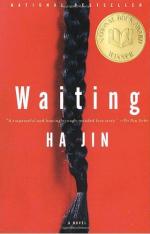
|
| Name: _________________________ | Period: ___________________ |
This test consists of 5 short answer questions, 10 short essay questions, and 1 (of 3) essay topics.
Short Answer Questions
1. After Lin's father dies, how do his feelings about his wife and marriage change?
2. What do Manna and Liang Meng talk about when they first meet at the hospital?
3. As Lin's attempts to divorce Shuyu continue to fail, how does Manna come to treat the other nurses?
4. Why can't anyone play cards as the people in Lin's dream do?
5. Why can't Manna be transferred to another hospital?
Short Essay Questions
1. What is the crowd at the courthouse defending when they are scolding Lin?
2. Why does Manna help Lin put dust covers on his books?
3. What about Lin's response to Manna's prospective engagement make him rethink his attachment?
4. What makes Lin hesitate to divorce his wife?
5. Why is Lin's response to "Leaves of Grass" peculiar to his usual tendencies towards literature?
6. What dilemmas do Shuyu's feet make for Lin?
7. Why does Lin discourage Manna from joining any of the revolutionary parties in the hospital?
8. How do the two men in Manna's life in Chapter 4 leave her between a rock and a hard place?
9. Why has Lin doubted himself of being a "normal" man? How does he gauge "normal?"
10. How does Lin change the direction of his and Manna's relationship as his divorce seems less and less likely?
Essay Topics
Write an essay for ONE of the following topics:
Essay Topic 1
Write an essay analyzing the narrative structure or "Waiting". Focus on the following:
- Its symmetry and organization.
- Its circular and recursive motion.
- Compare to traditional narrative structure (rising action, climax, falling action, etc.) and how "Waiting" breaks, uses, and redefines "structure".
Essay Topic 2
Discuss the relevance of women versus men in "Waiting." Argue the statement Ha Jin is making about gender, using the following ideas:
- Emotional tendencies of men or women in relationships.
- Self awareness, idealism, control, impressionability, vulnerability.
- Selfishness and selflessness.
Essay Topic 3
Discuss the parallels between the characters and the political context of China. What do the characters represent about the evolving political organization of China? What role do Chinese politics play in the lives of the characters?
|
This section contains 960 words (approx. 4 pages at 300 words per page) |

|




